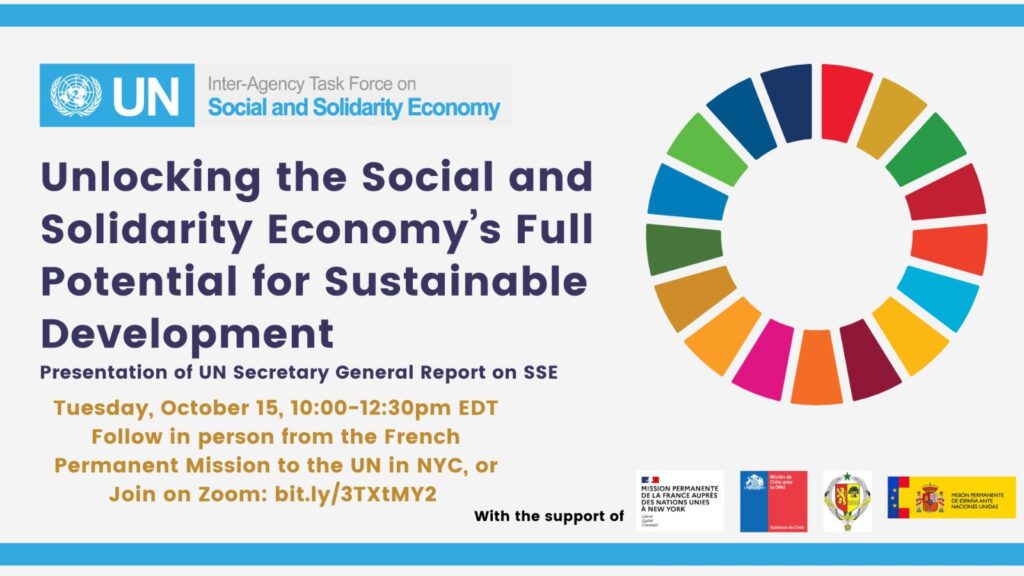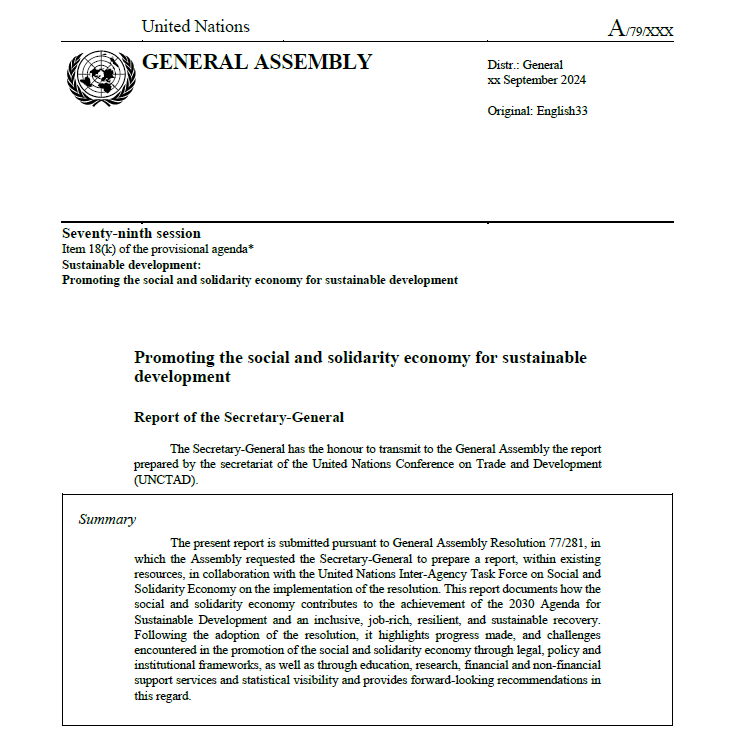
RIPESS Intercontinental is taking part in this hybrid event in which the ambassadors of France, Senegal and Chile, as well as the representative of the Spanish Government, the World Bank and other important actors on the world stage around the SSE join their support for a systemic change towards an economy that puts people and planet care at the centre.
The event has been organised by the United Nations Task Force on Social Solidarity Economy (UNTFSSE) since in the framework of the UN resolution 77/281 ‘Promoting social and solidarity economy for sustainable development’, the General Assembly requested the Secretary General to prepare a report, in collaboration with the UNTFSSE, to follow up on the resolution. This report was submitted on 14/10/2024 to the UN Economic and Financial Commission (Second Committee), and will open negotiations to update the UN resolution on the SSE.
The Secretary-General documents how the SSE contributes to the achievement of the 2030 Agenda for Sustainable Development and to an inclusive, job-rich, resilient and sustainable recovery. This event aimed to launch the report and facilitate a high-level exchange on the way forward, ensuring that the UN system can continue to contribute to unlocking the full potential of SSE to generate sustainable development.

Among the interventions that took place, Sandra Moreno, Executive Secretary of RIPESS Intercontinental, spoke after the representative of the Mondragon Group, who called for cooperation, solidarity with peoples in armed conflicts, networking and youth education in SSE. Sandra, for her part, presented various advances of RIPESS at the intercontinental level, highlighting the main key points of both RIPESS’s work and that of the other SSE actors:
- Just and eco-social transitions
- Care and youth
- Informal Economy
- Financing for development
It underlined the importance of working transversally, as in the case of the implementation of complementary policies on just transitions to support agroecology and food sovereignty, as expressed in the report to the SG: the use of existing UN instruments, such as UNDROP and UNDRIP, can provide a human rights framework from which SSE becomes more relevant. RIPESS and our member, URGENCI, have been involved in the negotiations on the policy on reducing inequalities in the Committee on Food Security, and have managed to get a whole paragraph dedicated to SSE. This is the first time that a policy document of the UN Committee on Food Security mentions SSE as a solution to food insecurity and to end inequalities.
She also highlighted the activities that RIPESS has carried out around the world, such as the activities of RESSCAM in Cameroon, ASSEFA in India, ASEC in ASEAN and other platforms in which it is present, as well as the work they carry out in cooperatives of platform workers; the project they are carrying out in RIPESS Europe on youth and care (YOUth’CARE); and the recent culminationof a collaborative process in RIPESS LAC to initiate a diploma in Solidarity and Popular Economies; or the recent culmination of a collaborative process in RIPESS LAC to initiate a diploma in Solidarity and Popular Economies make the work with institutions, with regional networks, with SSE grassroots communities; converge in a better quality of life at all levels for people involved in SSE processes.
It concluded by recommending that the actions of private state and international companies and finance support the development of social and solidarity-based financing mechanisms, such as ethical banking, financial cooperatives, community development banks and/or community-based savings schemes, as alternatives to conventional private financing. We also recommend that in International Development Cooperation actions, Multilateral Development Banks and other international development finance institutions, in collaboration with the UN Working Group on Social and Solidarity Economy, implement operative paragraph 3 of UN Resolution A/RES/77/281 on their role in financing the SSE.
Despite its potential, the SSE faces many challenges, such as limited access to funding, political barriers and lack of recognition. To overcome these barriers, we need Political support: governments need to create enabling environments that recognise and support the SSE, such as favourable tax policies and access to public procurement. Capacity building: Providing training and resources can enhance the skills of SSE actors, helping them to scale up their impact and sustainability. Collaboration is key. By building networks between SSE actors, governments and civil society, we can share resources, knowledge and best practices. These partnerships can amplify the impact of SSE initiatives and foster a more integrated approach to achieving the SDGs.
You can watch the entire webinar in English here. The RIPESS intervention is from 01:40min:




